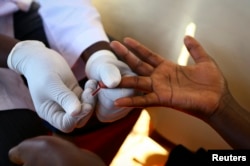Everyone agrees it sounds like a wonderful goal: The U.N. AIDS agency aims to end the deadly epidemic by the year 2030.
The agency’s “90-90-90” treatment plan, using 2020 as a target date, aims for 90 percent of people living with HIV to know their HIV status; 90 percent of HIV-positive people to receive treatment; and 90 percent of people on treatment to show suppressed viral loads.
The plan, in theory, would prevent nearly 28 million new HIV infections and 21 million AIDS-related deaths worldwide.
It won't come cheaply, UNAIDS said. In the next five years, low-income countries will need as much as $9.7 billion, and lower-middle-income countries will need $8.7 billion. That means the bill will fall on wealthier international donors, like the United States and other Western nations.
As experts from around the world converge on Durban, South Africa, for the International AIDS Conference that begins Monday, even the optimists say such goals won't be easy to reach.
Data look promising
That doesn’t mean it's not possible, said Matthew Kavanagh, senior policy analyst for the U.S.-based Health Global Access Project. The health statistics look promising; some countries, he said, have reached the 90-90-90 goals and others are close.
That’s what makes it maddening, he said: The end of AIDS could be within reach if donors invested more money and governments showed more political will to fight the disease. He sharply criticized major donors, including the U.S. and European nations, for giving greater priority to other problems.
Speaking to VOA from Durban, Kavanagh said he was worried that talk about the end of AIDS might overshadow problems at the conference.
“I am deeply disturbed that we don’t hear the emergency in the voice of UNAIDS and the United Nations," he said. “I hope that I don’t hear a lot of happy talk about how we’re on track to end AIDS, because we’re not. We could be, but the world is not showing a political will. ...
"We’re halfway to a goal. If we get the rest of the way to the goal, we could actually be in the space to talk about the end of AIDS. But given that we’re not on not on track, we need to be hearing about how there’s an emergency, how donors need to step up, how affected countries need to step up, how there needs to be a radical change in how we do business — or we won’t end AIDS.”
Scientists' warning
It’s clear the conference’s main figures don’t think so either. Just days before the conference’s Monday start, three of its main figures published a stern warning in Spotlight, a South African publication monitoring the nation's TB and HIV response.
Scientists Chris Beyrer, Linda-Gail Bekker and Françoise Barré-Sinoussi called for more donor commitments and more attention to at-risk groups, such as young women, men who have sex with men, drug users and transgender people.
“It is clear,” the three wrote, “that the global rhetoric around the current ‘end of AIDS’ needs to be matched with an equally robust reality check.”
Anele Yawa has seen that reality up close, as general secretary of South Africa’s Treatment Action Campaign, which lobbies for social justice, including for South Africans living with HIV. The nation carries the world’s highest AIDS burden, with UNAIDS estimating that 7 million people are HIV-positive.
Yawa said those patients are not getting the services they need — he cited chronic drug shortages, poor health care service and a shortage of health care workers — and that he planned to participate in a protest during the conference to demand improvements.
“Let’s not talk about an end to AIDS,” he told VOA. “Let’s talk about fixing the public health care system so that our public health care system can be able to deliver on these targets. There is no way that we can talk about ambitious numbers [if] the systems on the ground are still broken.”
Major change
The city of Durban last hosted the International AIDS Conference in 2000, and the meeting made global headlines for the wrong reasons. At the time, South Africa’s government all but denied AIDS existed and did little to fight it.
Today, 3.1 million South Africans receive antiretroviral treatment through government-funded programs.
Experts, however, warn that success can be a distraction. As more than 10,000 activists, experts, scientists and patients converge to discuss the latest work on treatment, vaccines and maybe even a cure, more than half of South Africans with HIV are untreated. For them, the end of AIDS is a faraway goal.





